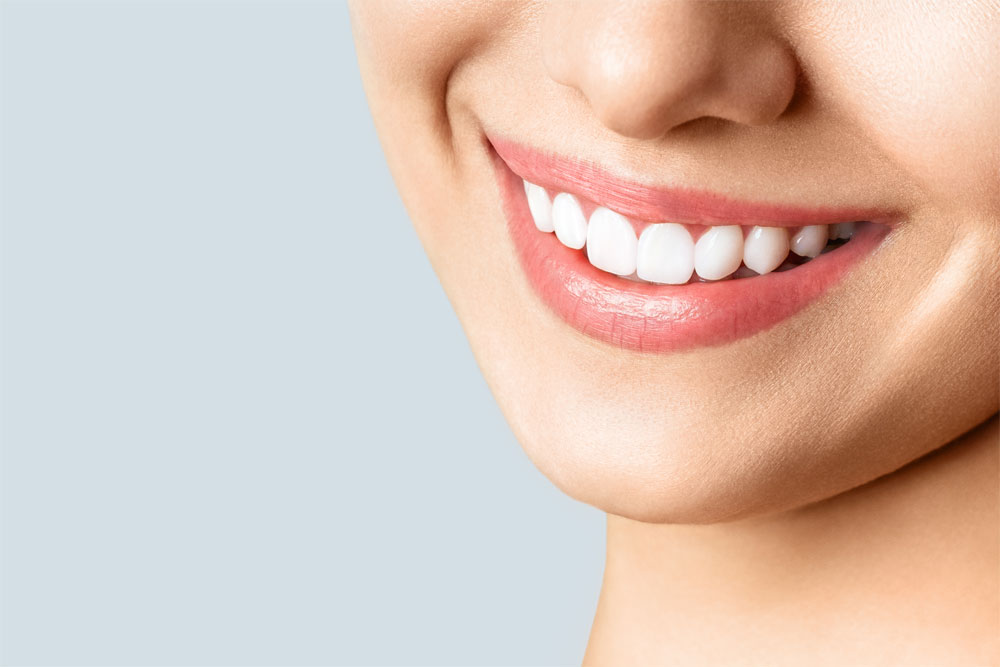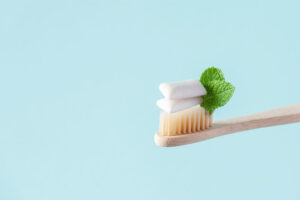July 14, 2025
Approaches to oral health are rapidly evolving. In recent years, oral care has transformed from a twice daily chore to a critical part of our holistic wellness. It is well known that our dietary habits impact our oral health. As children, we were taught that eating candy would lead to cavities. Overconsumption of sports and energy drinks can lead to enamel erosion. Tannins in coffee and chromophores in berries can lead to unsightly superficial tooth staining. Consuming these potentially detrimental foods and beverages in moderation has always been heralded by dentists to avoid these issues.
Recently a new trend has emerged in the food and nutrition space – products that promote oral health. From xylitol candies to antioxidant-rich beverages, foods claiming to benefit oral health are popping up around the globe.1 Nutritional supplements purporting to support oral health have also become a staple product in many Vitamin Mineral Supplement (VMS) brand portfolios.

Oral-Systemic Health Connections
There is mounting evidence supporting the bi-directional relationship between oral health and chronic conditions. Periodontal disease has been linked to diabetes, heart disease, and even Alzheimer’s.2 The oral microbiome has been linked to hypertension.3,4 These discoveries have caused many to redefine oral wellness. Brushing teeth is no longer just about preventing decay. The mouth is the gateway to the body, and potentially a reflection of overall health.
Emerging Formats and Use Occasions
 Mouthwash is out, nutritional supplements are in! One of the key learnings from recent research has been the importance of a healthy and balanced oral microbiome. Both dental decay and gum inflammation are correlated to increased prevalence of specific oral microbes.5 For decades, we have been using antiseptic mouthwash products formulated with essential oils, CPC, and/or alcohol that indiscriminately kill all oral microbes. We now understand that using antiseptic mouthwash can lead to dysbiosis, an imbalance in the microbial community, which can contribute to oral health problems.
Mouthwash is out, nutritional supplements are in! One of the key learnings from recent research has been the importance of a healthy and balanced oral microbiome. Both dental decay and gum inflammation are correlated to increased prevalence of specific oral microbes.5 For decades, we have been using antiseptic mouthwash products formulated with essential oils, CPC, and/or alcohol that indiscriminately kill all oral microbes. We now understand that using antiseptic mouthwash can lead to dysbiosis, an imbalance in the microbial community, which can contribute to oral health problems.
A more modern approach is to use products that target specific organisms, either to reduce populations of potential pathogens or to nourish beneficial species.6 Although these approaches can be applied to traditional formats (e.g., toothpaste and mouthwash), the short retention time of these products in the oral cavity is a limitation. Leave-on applications like serums and masks, and systemic products like mints, lozenges, and capsules; build on existing good habits instead of forcing a choice between myriad toothpaste options.
Nutritional supplements and functional confections like mints and gums are of particular interest because these products may directly or indirectly affect the composition of saliva. Saliva maintains homeostasis in the mouth. It protects teeth and provides nutrients for oral microorganisms.7 Saliva is derived, in part, from filtered modified blood components.7 Specific nutrient deficiencies can compromise saliva physiology, potentially leading to caries, periodontal disease, and other oral conditions.8 Functional gums and mints, and rapid dissolving tablets are able to deliver micronutrients directly to the saliva. These products also stimulate saliva production, thus can directly improve saliva composition although only temporarily. Traditional systemic supplements are digested in the stomach or lower GI tract, where micronutrients are absorbed into the bloodstream and may impact saliva composition indirectly. Furthermore, these products can be fortified with micronutrients such as vitamins A, C, D and K, which are not commonly found in toothpaste.
Conclusion
One could make a case that public water fluoridation is a form of supplementation with 80 years of scientific support.9 Use of chewing gums containing either fluoride or chlorhexidine have been demonstrated clinically to reduce carious lesions and gingival bleeding, respectively.10 However, when it comes to vitamins, there is little clinical evidence supporting supplementation can conclusively improve oral health.11,12 Researchers have observed reductions in both plaque and gingival inflammation in groups receiving supplements, but these studies are relatively few.13 Pre- and Probiotic supplementation, likewise, is an emerging area of research and current evidence is inconclusive.14
Confections like chewing gums and mints may directly add micronutrients to the saliva, but use of these products also stimulates production of saliva, regardless of their nutritional content.14 Furthermore, stimulated saliva naturally has higher levels of electrolytes and greater buffering capacity compared to unstimulated.7, 15 For these reasons, the American Dental Association (and other world heath organizations) recognize chewing sugar-free gum after meals can help to prevent tooth decay.16 The inherent positive impacts of using these products increases the challenge to demonstrate further benefits from fortifying these compositions with micronutrients.
The idea that agents can be delivered through supplementation or confections and positively impact oral health is scientifically sound. There is strong consumer interest in supplementation to improve oral health. This is likely to grow as consumers continue to seek more natural products and holistic approaches to wellness. Increased awareness of the bi-directional relationship between oral and systemic health coupled with growing availability of economical at-home saliva test kits may also propel consumers towards supplementation to correct any perceived nutritional deficiencies.
References
- Teodoro M. Nutrition Watch: Total Oral Health. Mintel. 2024 Jul.
- American Academy of Periodontology. Gum Disease and Other Diseases [Internet]. American Academy of Periodontology. 2024. Available from: https://www.perio.org/for-patients/gum-disease-information/gum-disease-and-other-diseases/
- LaMonte MJ, Gordon JH, Diaz-Moreno P, Andrews CA, Shimbo D, Hovey KM, Buck MJ, Wactawski-Wende J. Oral Microbiome Is Associated With Incident Hypertension Among Postmenopausal Women. J Am Heart Assoc. 2022 Mar 15;11(6):e021930. doi: 10.1161/JAHA.121.021930. Epub 2022 Mar 2. PMID: 35234044; PMCID: PMC9075295.
- Bryan NS, Tribble G, Angelov N. Oral Microbiome and Nitric Oxide: the Missing Link in the Management of Blood Pressure. Curr Hypertens Rep. 2017 Apr;19(4):33. doi: 10.1007/s11906-017-0725-2. PMID: 28353075.
- Radaic A, Kapila YL. The oralome and its dysbiosis: New insights into oral microbiome-host interactions. Comput Struct Biotechnol J. 2021 Feb 27;19:1335-1360. doi: 10.1016/j.csbj.2021.02.010. PMID: 33777334; PMCID: PMC7960681.
- Coates H. The Next Wellness Frontier: Your Mouth [Internet]. The Business of Fashion. 2025 [cited 2025 Jun 25]. Available from: https://www.businessoffashion.com/articles/beauty/the-next-wellness-frontier-oral-microbiome-products/
- Aps JK, Martens LC. Review: The physiology of saliva and transfer of drugs into saliva. Forensic Sci Int. 2005 Jun 10;150(2-3):119-31. doi: 10.1016/j.forsciint.2004.10.026. PMID: 15944052.
- Vila T, Rizk AM, Sultan AS, Jabra-Rizk MA. The power of saliva: Antimicrobial and beyond. PLoS Pathog. 2019 Nov 14;15(11):e1008058. doi: 10.1371/journal.ppat.1008058. PMID: 31725797; PMCID: PMC6855406.
- Iheozor-Ejiofor, Z., Walsh, T., Lewis, S. R., Riley, P., Boyers, D., Clarkson, J. E., Worthington, H. V., Glenny, A. M., & O’Malley, L. (2024). Water fluoridation for the prevention of dental caries. The Cochrane database of systematic reviews, 10(10), CD010856.
- Hattab FN. Chewing Gum for Oral and Dental Health: A Review. J Oral Health Comm Dent 2023; 17 (1):12-19.
- Sheetal A, Hiremath VK, Patil AG, Sajjansetty S, Kumar SR. Malnutrition and its oral outcome – a review. J Clin Diagn Res. 2013 Jan;7(1):178-80. doi: 10.7860/JCDR/2012/5104.2702. Epub 2013 Jan 1. PMID: 23449967; PMCID: PMC3576783.
- Cagetti MG, Wolf TG, Tennert C, Camoni N, Lingström P, Campus G. The Role of Vitamins in Oral Health. A Systematic Review and Meta-Analysis. Int J Environ Res Public Health. 2020 Feb 3;17(3):938. doi: 10.3390/ijerph17030938. PMID: 32028631; PMCID: PMC7037089.
- Shodhan Shetty A, Shenoy R, Dasson Bajaj P, Rao A, Ks A, Pai M, Br A, Jodalli P. Role of nutritional supplements on oral health in adults – A systematic review. F1000Res. 2023 May 15;12:492. doi: 10.12688/f1000research.134299.1. PMID: 37359787; PMCID: PMC10285321.
- Yu X, Devine DA, Vernon JJ. Manipulating the diseased oral microbiome: the power of probiotics and prebiotics. J Oral Microbiol. 2024 Jan 31;16(1):2307416. doi: 10.1080/20002297.2024.2307416. PMID: 38304119; PMCID: PMC10833113.
- Ly KA, Milgrom P, Rothen M. The potential of dental-protective chewing gum in oral health interventions. J Am Dent Assoc. 2008 May;139(5):553-63. doi: 10.14219/jada.archive.2008.0215. PMID: 18451371.
- American Dental Association. Chewing Gum [Internet]. Mouthhealthy.org. 2023. Available from: https://www.mouthhealthy.org/all-topics-a-z/chewing-gum
